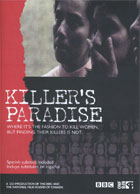
Killer’s Paradise 2007
Distributed by National Film Board of Canada, 1123 Broadway, Suite 307, New York, NY 10010; 800-542-2164
Produced by Giselle Portenier
Directed by Giselle Portenier
DVD, color, 83 min.
Sr. High - Adult
Gender Studies, Human Rights, Latin American Studies, Women's Studies
Date Entered: 03/10/2010
Reviewed by Kayo Denda, Rutgers UniversityIn the last decade, more than two thousand women have been murdered in Guatemala, and every year, their numbers escalate. Directed by Giselle Portenier and narrated by Olenka Krenkiel, this powerful documentary uncovers the atrocities committed against women as well as human rights abuses, while exposing the lack of action by a corrupt judicial system. As a country ravaged by civil war for almost four decades, the legacy of lawlessness and impunity pervades all levels of government, particularly in regard to violence against women.
The film skillfully includes the striking realism of crime scenes, as well as dramatic testimonials and interviews with individuals from all sides. Family members of women who were killed speak of the memories of their daughters and sisters and the circumstances under which they disappeared. Despite their pleas for justice, their cases were never investigated. Norma Cruz, a human rights attorney whose daughter was raped works relentlessly to shield other girls from violence. Cruz speaks of the country’s brutal civil war past, when 200,000 citizens disappeared, that left a legacy of brutality among its citizens, especially against women. Others, such as Maria Elena Peralta and Jorge Velasquez are committed to find justice to honor their sister and daughter. It is encouraging to see that along with Cruz, Peralta and Velasquez, others are fighting to quell their anger, frustration and loss, as well as expose the reality to a broader audience. In contrast, the interviews with inmates who committed rape offer discouraging portraits of young men in Guatemala, who lack basic human respect for others, believe that women should stay exclusively at home, and resort to violence as the only way to express themselves.
Killer’s Paradise is meticulously crafted capturing strong emotions and bleak reality. The different segments of the film are framed by a series of black and white still photos of the victims with their names, providing structure and gravity. The list of officers in the criminal justice sphere and politicians interviewed is extensive, including Oscar Berger, the president of Guatemala. They all deny incompetence, fail to acknowledge the scope of the problem and offer no practical solutions. This film enables audiences to engage with questions about patriarchy, violence against women and human rights, as well as appreciate the work of activists such as Norma Cruz and others.